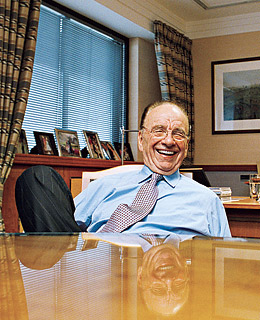
Keith Rupert Murdoch is finally, at 77, what he has long dreamed of being: the world's most influential newspaper publisher. He is also much more than that: his $29 billion (revenue) News Corp. churns out films, video news and entertainment, books and Web content galore. While people think of Murdoch as rough-hewn and self-made, which in many ways he is, his background is gilded: he studied at Oxford and inherited his first newspaper.
Murdoch likes to place big bets and usually wins, although he teetered close to bankruptcy at least once, circa 1990. His genius flowed from seeing early that the revenue from then thriving newspapers could be leveraged to expand not only his original business but into other areas as well, most notably in acquiring a movie studio, building a fourth U.S. broadcast television network, driving forward satellite television with Sky, STAR and DirecTV and then boldly buying MySpace. His latest major purchase, Dow Jones, adds the Wall Street Journal to a newspaper collection that already included prestige nameplates in Britain (the Times) and his native Australia (the Australian) as well as the pulpier New York Post and Britain's News of the World and the Sun.
There is, to be sure, a darker side to Murdoch's influence and legacy. He has at times subordinated the journalism operations he controls to further his own business interests, undermining their credibility if not their long-term profitability. His own test of journalism sometimes seems to be what sells—no less but also no more. Yet Fox News, which many liberals decry as a conservative political pander by Murdoch, is actually best understood as a product designed to fill an untapped market niche in video news. It succeeded brilliantly.
A return to his roots and a victory lap of sorts, acquiring the Journal poses for Murdoch perhaps his greatest test as a publisher. He aspires to make money and extend the paper's reach while maintaining its prestige—a tall order, even for him.
Steiger, former managing editor of the Wall Street Journal, is editor in chief of ProPublica